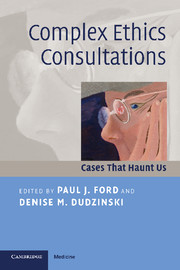Book contents
- Frontmatter
- Contents
- List of contributors
- Foreword
- Acknowledgments
- Introduction: Live and learn: courage, honesty, and vulnerability
- Part I Starting at the beginning: prenatal and neonatal issues
- Part II The most vulnerable of us: pediatrics
- Part III Diversity of desires and limits of liberty: psychiatric and psychological issues
- Part IV Withholding therapy with a twist
- Part V The unspeakable/unassailable: religious and cultural beliefs
- 17 Adolescent pregnancy, confidentiality, and culture
- 18 “Tanya, the one with Jonathan's kidney”: a living unrelated donor case of church associates
- 19 Futility, Islam, and death
- 20 Suffering as God's will
- Part VI Human guinea pigs and miracles: clinical innovations and unorthodox treatment
- Part VII The big picture: organizational issues
- Conclusions, educational activities, and references
- Index
19 - Futility, Islam, and death
Published online by Cambridge University Press: 03 May 2010
- Frontmatter
- Contents
- List of contributors
- Foreword
- Acknowledgments
- Introduction: Live and learn: courage, honesty, and vulnerability
- Part I Starting at the beginning: prenatal and neonatal issues
- Part II The most vulnerable of us: pediatrics
- Part III Diversity of desires and limits of liberty: psychiatric and psychological issues
- Part IV Withholding therapy with a twist
- Part V The unspeakable/unassailable: religious and cultural beliefs
- 17 Adolescent pregnancy, confidentiality, and culture
- 18 “Tanya, the one with Jonathan's kidney”: a living unrelated donor case of church associates
- 19 Futility, Islam, and death
- 20 Suffering as God's will
- Part VI Human guinea pigs and miracles: clinical innovations and unorthodox treatment
- Part VII The big picture: organizational issues
- Conclusions, educational activities, and references
- Index
Summary
Case narrative
Some cases stay with us because communication goes awry despite our best efforts, because hoped-for outcomes elude us, or because we make bonds with patients or families in deep or unexpected ways. In the aftermath of this case, I felt shaken to the core, questioning my role as a physician-ethicist. It drove home a profound respect for the strain we escalate by asking families to confront death head-on.
For several weeks during biweekly multidisciplinary rounds in the medical intensive-care unit (ICU), the staff updated the bioethicist on-call about Sharma, a 24-year-old woman with acute myelogenous leukemia who had suffered cardiac arrest on the oncology ward after beginning chemotherapy. She had been resuscitated but remained comatose from severe, irreversible brain damage. Looking at her lying inert in bed was wrenching even to me as a seasoned intensivist. She was massively swollen and bruised, festooned with IV lines, support machines, and tubes, and oozing blood from almost every line site and bandage, epitomizing “invasive” and “aggressive” therapy. Her nurses and doctors looked sobered and almost angry, but they were quiet and gentle at her bedside. Her leukemia was still active, but she could not receive further chemotherapy because of her multiple organ system damage.
All physicians and nurses involved in her care now believed that comfort care rather than intensive care was the only medically appropriate thing to do since her underlying leukemia could not be treated. Her mother and durable power of attorney for health care, Mrs. Abu, refused to allow withdrawal of support based on her religious beliefs. A bioethics consult was requested to help mediate further discussions with the patient's family.
- Type
- Chapter
- Information
- Complex Ethics ConsultationsCases that Haunt Us, pp. 148 - 154Publisher: Cambridge University PressPrint publication year: 2008



